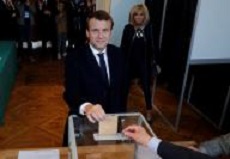
PARIS – Emmanuel Macron was elected president of France on Sunday with a business-friendly vision of European integration, defeating Marine Le Pen, a far-right nationalist who threatened to take France out of the European Union, early projections showed.
The centrist’s emphatic victory, which also smashed the dominance of France’s mainstream parties, will bring huge relief to European allies who had feared another populist upheaval to follow Britain’s vote to quit the EU and Donald Trump’s election as U.S. president.
The 39-year-old former investment banker, who served for two years as economy minister but has never previously held elected office, will now become France’s youngest leader since Napoleon with a promise to transcend outdated left-right divisions.
Three projections, issued within minutes of polling stations closing at 8 p.m. (1800 GMT), showed Macron beating Le Pen by around 65 percent to 35 – a gap wider than the 20 or so percentage points that pre-election surveys had pointed to.
Even so, it was a record performance for the National Front, a party whose anti-immigrant policies until recently made it a pariah in French politics, and underlined the scale of the divisions that he must try to heal.
Le Pen’s high-spending, anti-globalisation ‘France-first’ policies may have unnerved financial markets but they appealed to many poorer members of society against a background of high unemployment, social tensions and security concerns.
The 48-year-old’s share of the vote was set to be almost twice that won by her father Jean-Marie, the last National Front candidate to qualify for a presidential runoff, who was trounced by Jacques Chirac in 2002.
Macron’s immediate challenge will be to secure a majority in next month’s parliamentary election for En Marche! (Onwards!), his political movement that is barely a year old, in order to implement his programme.
A poll on Friday had predicted a final turnout of 75 percent this time. The eventual turnouts in 2002, 2007 and 2012 were all above 80 percent.
Pollsters see likely abstentions as highest among left-wing voters who feel disenfranchised by Sunday’s choice after nine other candidates were eliminated in first round, but it is unclear what a high or low turnout could mean for the outcome.
Nevertheless, voter surveys forecasting the result itself proved accurate for the tight first round race last month.
Markets have risen in response to Macron’s widening lead over his rival after a bitter television debate on Wednesday.
“We increased our equity exposure and added some French stocks after the first round,” said Francois Savary, chief investment officer at Geneva-based fund management firm Prime Partners. “The major political risk of a Le Pen victory appears to be disappearing.”
After a campaign in which favourites dropped out of the race one after the other, Le Pen is nevertheless closer to elected power than the far right has been in France since World War Two.
If opinion polls prove accurate and the country elects its youngest-ever president rather than its first female leader, Macron himself has said himself he expects no honeymoon period.
Close to 60 percent of those who plan to vote for Macron say they will do so to stop Le Pen from being elected to lead the euro zone’s second-largest economy, rather than because they fully support the former banker turned politician.
“I don’t necessarily agree with either of the candidates,” psychotherapist Denise Dulliand, who was voting in Annecy in the mountainous southeast, told Reuters.
Source – Reuters